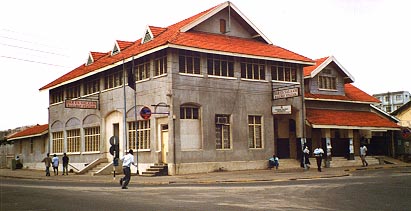LangMedia
Swahili in Tanzania
Traveling by Train

Trains are usually used for longer trips or for places connected by dirt roads, which make bus travel uncomfortable. Tickets should be purchased at least a week in advance since trains are always quite full, so much so that, unless you get on at the point of origin, you may well not get a seat, even on a trip of a few days. Should you change your mind before you travel, you can always exchange the ticket. Deciding to travel on the spur of the moment can lead to standing in long lines trying to outbid the next person for the few remaining tickets.
There are 3 or 4 classes of train cars. In first class, there will be fewer people with 2-4 per compartment. Second class divides its compartments between men and women while third class is the most crowded because it is the least expensive. The compartments become little enclaves of friends during the trip. The compartment seats open into beds for overnight travel. Passengers need to bring up to a week's worth of water and a food supply (sometimes food can be purchased when the train stops in a small town). Trains adhere to the schedules unless there are track problems or breakdowns which occur frequently. It is possible that you find yourself stuck between towns for a long period of time, so it is important to have (especially) your own water and (sometimes) food supply. You will also need to provide your own water for washing and brushing your teeth, since the water in the bathrooms may not be clean. It is a good idea to keep a close eye on your luggage and belongings; do not travel with "extras" such as a Walkman.
Audio
Click on the text to hear the spoken phrase.
-
"first class"
daraja la kwanza -
"second class"
(sitting)
daraja la pili (la kukaa) -
"second class"
(sleeping)
daraja la pili (la kulala) -
"third class"
daraja la tatu -
"Please show me where I should sit."
Tafadhali nionyesha ninatakiwa kukaa wapi. -
"Please guard my things."
Naomba nilindie vitu vyangu. -
"What is the next station?"
Kituo kinachofwata ndio kipi? -
"When will we arrive at Vwawa?"
Tutafika Vwawa saa ngapi? -
"Please tell me when we are near Vwawa."
Tafadhali niambie tutakapoanza kukaribia Vwawa.
